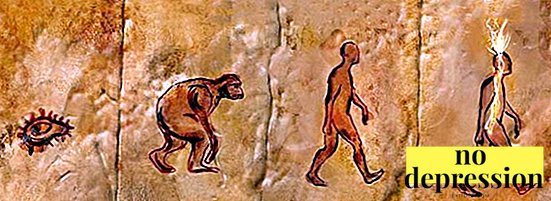
Fear of going crazy
Fear of going crazy, but also fear of losing body control - very frequent companions of panic attacks, panic disorder and anxiety disorder.
How do these fears manifest?
For example, you hold your child in your arms. And suddenly the thought creeps in his head: "what if I do something to him?"
Or do you wash the window, and your "caring" mind tells you: "what if you jump?"
Following these thoughts, there is a feeling of anxiety, fear. Your rich imagination paints pictures of brilliant somersaults that the body writes out in the air. You don’t like such a movie, it scares you. Suddenly it will happen during the next attack.
Or you are constantly haunted by the fear of insanity:
"What if it's not panic attacks, but schizophrenia?"
And you without delay open the description of this diagnosis in Wikipedia. "There are no voices in my head, no hallucinations, thank God, this is not about me."
But your relief is immediately interrupted by the thought:
"But what if it does, I just can't recognize ..."
"Now it is not, but it suddenly begins, these attacks will bring me ..."
"I remember that when I fell asleep I heard a voice! I am sick!"
"Yes, there are no symptoms of the disease, but sometimes I feel abnormal ..."
These fears are familiar to me. I remember how my first attack happened. I lay in bed, trying to fall asleep, and suddenly, as if out of nowhere, came wild, animal fear.
I did not know what was happening to me. I just lay with the feeling that I would die from fear. I began to think to myself: "Well, everything, Kolya, arrived, you brought yourself to the hospital."
This first attack was followed by the following. I later learned that I suffer from panic disorder and that this does not make me mad. However, the knowledge of this fact did not reassure me much. At the time of the attack, I was still afraid that something might happen to me.
That I'm going crazy.
That I lose control of myself and hit my wife. Not from anger, but simply because I'm crazy.
That I lose control of my body and cut myself with a knife, jump under the car, do something awful.
Fortunately, all these fears are in the past for me and for many of my clients. And I know that you can stop suffering them forever!
And in this article I will tell you how to get rid of this fear.
But first I want to talk about where this fear comes from and why you have it.
“Well, Nikolay, well, I’ve delayed it, let’s have the technicians to quickly get rid of it” - if you thought so, let me tell you something.
As a psychologist, I know that communicating a problem is an essential part of treatment. If you want to solve a problem, then you need to know what you are facing. Your psychotherapist will also be engaged in informing if you address him. Only in this article I give this information for free. This time.
The second point is that if it is difficult for you to spend 10 - 15 minutes on a thoughtful reading of an article about your problem, then, in my opinion, you can hardly hope to get rid of PA on your own. Because recovery will also require time and effort. There are no magic tips. Therefore, you want to get rid of it - read to the end and read in its entirety.
Where does this fear come from?
I decided not to write two separate articles on fear of losing my mind and fear of losing control over my body, since these fears are very similar. I view both of these fears in a single article.
As I wrote, these fears are very common.
I had many clients who told me something like this:
"Nikolai, I have not quite ordinary panic attacks. I have such a unique fear. I’m afraid to go crazy! . "
But do not worry, the problem is not so rare. According to my personal statistics, approximately 80% of people suffering from PA are afraid of losing their mind or losing control. Yes, and I myself in the past most feared just madness.
If you suffer from panic attacks, you can sign up for my free online course, 3 Antidotes to Panic, the purpose of which is to teach you how to deal with panic attacks.
Someone is more afraid of death. But I was frightened by the very prospect of "going astray." Since it is worse than cessation of existence. This is some kind of wrong, perverted, frightening existence.
Why, both at the time of the attack and in between, can you experience this kind of fear?
There are several possible explanations.
The explanation that is closest to me is based on the context of the onset of the attacks. A panic attack is a manifestation of the so-called “hit or run” mechanism, which is activated at the moment of danger.
That is, the same symptoms (rapid heartbeat, rapid breathing, tension in the body, dizziness, and even derealization) occur at the time of the threat.
But in moments of real danger, if you, for example, are threatened by a gangster with a knife, you will not think about the safety of your mind. You will be saved from danger.
You will not have time to go through all the alarming scenarios:
"What if he kills me?"
"What if I can't run away?"
You will act with lightning speed.
In addition, the very context of what is happening does not cause internal issues: internal sensations correspond to the external situation. You are attacked - you have a strong fear. Everything is logical and logical.
But at the moment of a panic attack, which is not caused by immediate danger, there is a mismatch of contexts.
To put it simply: there is no threat, but inside there are such sensations as if it is.
The very fact that fear comes as if from nowhere knocks the ground out from under their feet and makes them think about the safety of their own reason.
I remember how keenly I felt all the "abnormalities" of the situation when I was lying in a warm, cozy bed, and I was torn by such fear, as if I was running away from a tribe of crazy natives on some island!
How is this possible? Am I crazy?
Another point is that the fact that there is no danger forms the space for the emergence of all the various scary scenarios and catastrophic thoughts!
American psychologist James Carbonell in his book "Do not fall into the trap of anxiety," points to the following paradox.
The very fact of thinking about a threat often confirms the absence of any threat.
Because if something really threatens you here and now, then you have no opportunity to think about it - you will be saved.
And since you have time to think about something else, it means that the possibility of danger should be subjected to great doubt.
In a state of panic attack, adrenaline and norepinephrine are released, the amygdala is activated, that is, the brain is in a state of "anxiety". And if there is no danger, your brain will surely “find it,” because at the present moment of time the threat response system is excited.
"What if a heart attack?"
"What if I suffocate?"
"And suddenly, and suddenly, and suddenly ...."
Panic attacks often suffer in all senses healthy people. They may be completely absent from any history of mental illness. Often these are strong women, healthy men: psychologists, teachers, doctors, police and firefighters. And suddenly, in such a healthy wild boar, there are bouts of uncontrollable fear!
From the habit of thinking about their own abnormalities. I understand that perfectly.
But I repeat, there is nothing abnormal in this. Attacks - it's just a failure of the "hit or run" mechanism. This is not dangerous. It is treatable.
Can you really go crazy and lose control?
NOT! No and no again.
Panic disorder has been studied for almost a hundred years. During all this time there have been no such cases that someone went crazy with PA.
Yes, maybe you met on the Internet or even saw inappropriate comments under my videos: frightening stories about how the attacks led to some terrible actions.
Keep in mind the following.
Panic attacks suffer not only healthy people! Panic attacks can occur in a schizophrenic, in a person who suffers from hysterical disorder, in any very notorious psychopath (and why not, they are people too!).
And very often, the unforeseen actions that these people perform are due to another disorder, and not panic attacks.
Yes, I understand that when you have a strong fear, it is difficult to calm yourself. Often it is the irrational sense of "abnormality" of the situation.
But feelings during the PA can be what you want.
When the “hit or run” mechanism is activated, you may feel like you are dying. Right now you die. Not dead? "Well, just a little bit and just die!" - you think.
Nevertheless, your body refuses to die.
Or "I'll go crazy now!" Not gone? Well, it's only because you are so tense, trying to keep control. We tried our best "not to go crazy!" But you should let him go ...
Just kidding You are not crazy because the PA does not go crazy. During a panic attack, a furious chemical storm rages in your brain: knock down the squalls of adrenaline, cover the waves of cortisol, overturn the rush of norepinephrine. And if during such a storm something starts to seem to you ...
DON'T BELIEVE IT!
THIS IS A LIE!
This is an illusion caused by an internal reaction to a non-existent danger.

If you are afraid of going crazy, then you are not going crazy!
Remember this principle well. People who really go crazy, as a rule, are not afraid of it. Such people will not think: "what terrible thoughts come to my mind, I must be crazy!"
They will most likely think: "I can read the thoughts of other people, this is natural, because I am a chosen messenger from another planet!"
That is, they are in harmony with their madness. And since you are afraid of the prospect of a loss of reason, if the opportunity itself seems alien to you, then you are all right.
And then I will give some effective methods to overcome the fear of going crazy and fear of losing control over your own body.
Technique 1 - Affirmations and Installations
One of the ways to work with disturbing thoughts during a panic attack is to replace these thoughts with more realistic ones.
For example, various alarming scenarios occur to you. As you grab the knife and rush at someone with a shout: "No, I do not want to do this, but the panic attack makes me!" As you jump out the window with a mad shriek. How do the orderlies knit you
straitjacket and driven into a fool, where you will be adjacent to Napoleon and the Pope.
In fact, this is all a hoax. These thoughts are simply caused by momentary fear and the fact of "mismatch of contexts."
Therefore, you can replace these thoughts with realistic ones:
"I'm fine, it's just a panic attack, which does not go crazy."
"These are just temporary sensations."
"It's just an adrenaline rush, fear has big eyes."
This is a good method. It sometimes works, especially if you take some time to practice this skill.
They often write to me: "it's easy to say, but during an attack of PA, I feel so bad, how can I do this?"
I understand it. But everything is possible. And not everything works right away. Just to perform each technique need training.
And by the way, please note that at the beginning of the description of this technique I used a bit of humor. You can also use this when a seizure occurs: emor and fear are not compatible. Try to take less seriously what happens to you during an attack.
Technique 2 - Move body part
If you are afraid that you will stop controlling your body, say to yourself: "but now I will move my index finger and middle finger of my right hand."
And do it, move your fingers. So you make sure that you still control the body.
Such advice is given by some psychologists. But be careful with him, do not turn this method into an obsessive habit.
Technique 3 - Relaxation
When a panic attack and hit-and-run syndrome occurs
Direct attention to the tense areas of the body, most often with anxiety and panic, the neck and face are tense. And with the exhale, calmly release the tension. =
Sounds weird. How can you relax when fear and panic literally hold you down, scary thoughts rummage chaotically in your mind, does your body penetrate tension?
However, again, everything is possible with regular practice of relaxation techniques, for example, the practice of diaphragmatic breathing.
Technique 4 - Release Control!
And here we come to the beloved. The techniques I described above (except, perhaps, relaxation) have one serious drawback. Yes, they often work. But nevertheless, in their basic essence, at the deepest level, they sometimes “feed” fear, as it were.
I do not want to say that they do not need to perform. They just have limitations.
Let's try to explain what's the matter.
Why are you even trying to prove to yourself that everything is all right with you and that you are not going crazy?
Because you are still afraid of it. You are afraid of the worst scenario that comes to your mind, so look for evidence that this will never happen, based on common sense.
That is, the very desire to apply the technique of affirmations and realistic attitudes comes from fear.
And since it comes from fear, the final word very often remains for fear.
I will show by example:
"I'm fine, I cope, the PA does not go crazy"
And your fear tells you:
"What if it's not PA?" - and went on a new one. Do you understand what I mean?
Another problem is when during an attack you try to find support in a common sense, that part of your consciousness that is responsible for that “common sense” during a panic attack is strongly suppressed. (The limbic system of the brain is activated, and the anterior cortex is suppressed)
Therefore, attempts to go against fear, to try to refute it, sometimes seem like a desire to go against the wind on a ship:
Of course, you can contrive, put the nose of your ship so that in the end it reaches the coast against the wind. But it will be a very tedious voyage.
Therefore, my most favorite way, which has rescued me more than once, is a way to relax and stop going against fear.
This method is good because it does not happen out of fear, but from a state of accepting what is happening to you!
What am I trying to say? Sometimes it works very well when you stop convincing yourself that everything will be alright with you. When you just completely surrender to this fear. Accept everything that happens to you, releasing any resistance:
- “Let me go crazy, I don’t care!” Let them take me to an insane asylum “If this is destined to go through, let it be!”
Yes, I want to soothe and reassure myself instinctively. It's easier. And often it works. But a fail-safe way, albeit requiring a longer workout, is acceptance.
Because at this level of panic attack there is nothing to parasitize. Panic attacks are like parasites that cling to what is most valuable to you: health, sanity, close people, your life. And if you say that at the moment nothing matters to you, "come what may", then in that case fear will not cling to anything, nothing to scare you, because you are ready for anything.
And then fear subsides, losing its support.
But I repeat, if it is difficult for you to understand how to carry out this technique. Or you tried it did not work for you, I remind you that not all at once. Technicians require training. And if you perform them regularly, then soon you will feel relief and confidence.
I remember that in my life such a day came when I began to think like this: "come on, attack, come on, I don’t care! I am ready to meet and reflect you!"
And soon the time came when the attacks left me.
But this happened only when I stopped wanting them to pass!
"Wait, Nikolai, what?"
Shout you!
And I decide to leave you alone with this paradox. In the comments you can write, as you understand this phrase.
Attacks will pass when you stop wanting them to pass!



